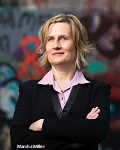2007, 2019
Janine G. Barchas
- Professor
- University of Texas at Austin

Abstract
Bookseller Edmund Curll (1675-1747) and master printer Samuel Richardson (1689-1761) each ran thriving businesses in London’s eighteenth-century book trade. Their reputations, however, could not be more distinct. Critical discussion vilifies the former as a Grubstreet scoundrel and lionizes the latter as a moral force. The early eighteenth-century book trade was, in fact, far less polarized in practice than such conventional accounts suggest. This project re-examines the early book trade (especially marketing strategies, reading communities, the role of the Stationers’ Co., and the emerging woman writer) in light of what scholars are learning about the overlap between “high” and “low” literature—between the industry’s genteel output and so-called Grubstreet ephemera.
Abstract
When Jane Austen was born in 1775, the burgeoning consumer culture of late-Georgian England increasingly allowed temporary ownership over certain luxury goods for a fee. Books and artworks could be borrowed, furniture and musical instruments rented, carriages or horses hired, and whole country mansions let. Some rentals were bizarre, e.g. pineapples, but all of them complicated identity politics by blurring traditional social signals of rank. Whereas old sumptuary laws aimed to fix luxury goods as markers of class, in Austen’s era privilege could be flaunted with kit and carriages not one’s own. This project explores the messy logistics of what was rented—where, to whom, and at what prices—to reveal the social implications for this early economy of temporary possession.

